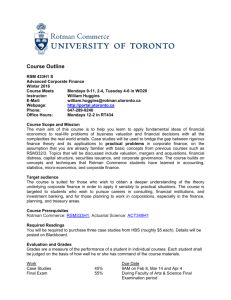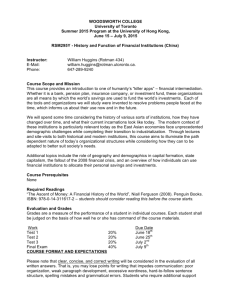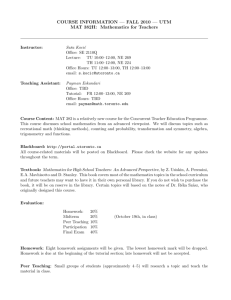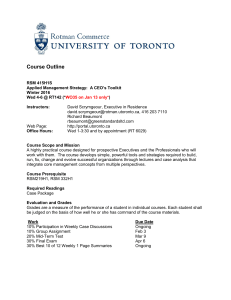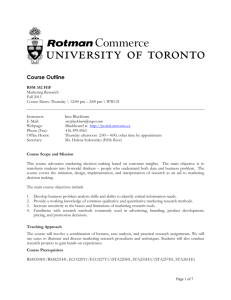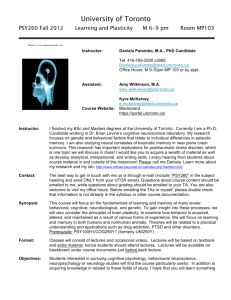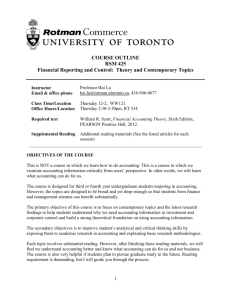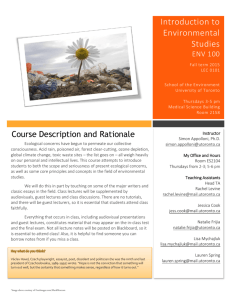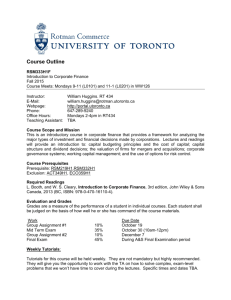Course Outline - University of Toronto
advertisement
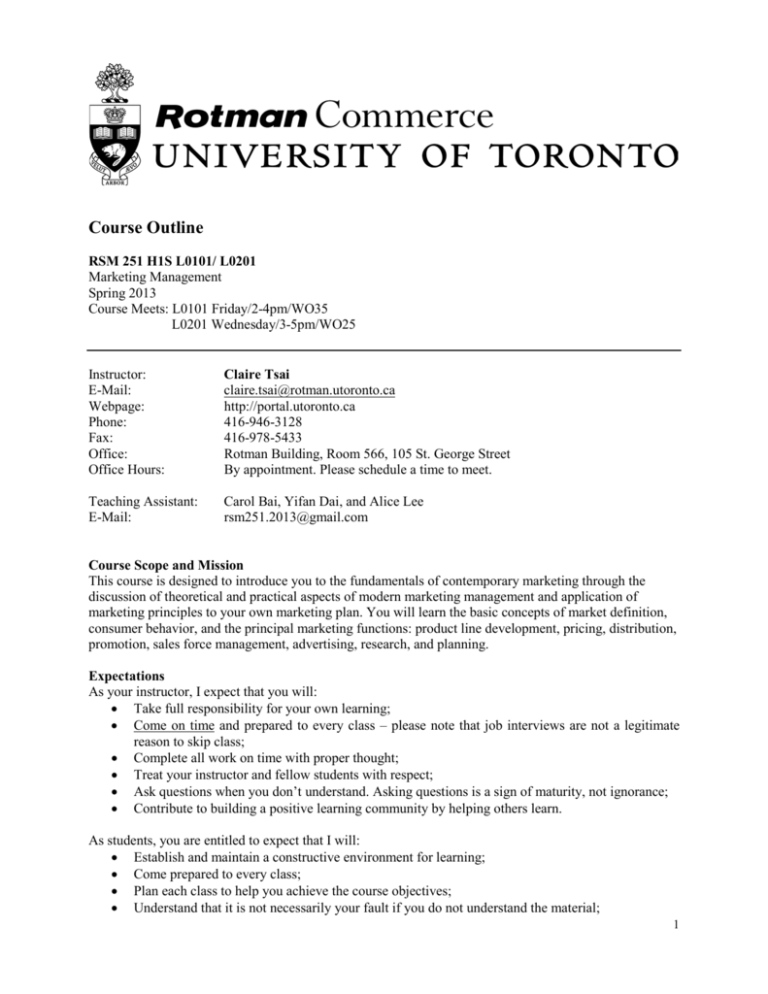
Course Outline RSM 251 H1S L0101/ L0201 Marketing Management Spring 2013 Course Meets: L0101 Friday/2-4pm/WO35 L0201 Wednesday/3-5pm/WO25 Instructor: E-Mail: Webpage: Phone: Fax: Office: Office Hours: Claire Tsai claire.tsai@rotman.utoronto.ca http://portal.utoronto.ca 416-946-3128 416-978-5433 Rotman Building, Room 566, 105 St. George Street By appointment. Please schedule a time to meet. Teaching Assistant: E-Mail: Carol Bai, Yifan Dai, and Alice Lee rsm251.2013@gmail.com Course Scope and Mission This course is designed to introduce you to the fundamentals of contemporary marketing through the discussion of theoretical and practical aspects of modern marketing management and application of marketing principles to your own marketing plan. You will learn the basic concepts of market definition, consumer behavior, and the principal marketing functions: product line development, pricing, distribution, promotion, sales force management, advertising, research, and planning. Expectations As your instructor, I expect that you will: • Take full responsibility for your own learning; • Come on time and prepared to every class – please note that job interviews are not a legitimate reason to skip class; • Complete all work on time with proper thought; • Treat your instructor and fellow students with respect; • Ask questions when you don’t understand. Asking questions is a sign of maturity, not ignorance; • Contribute to building a positive learning community by helping others learn. As students, you are entitled to expect that I will: • Establish and maintain a constructive environment for learning; • Come prepared to every class; • Plan each class to help you achieve the course objectives; • Understand that it is not necessarily your fault if you do not understand the material; 1 • • Provide clear guidelines for assignments; Provide timely and useful feedback. Course Prerequisites Principles of Marketing (MGT252 or RSM250) is the prerequisite course. It is strongly recommended that students be familiar with the material in introductory courses in economics and statistics. MGT353H1/RSM350H1 is an exclusion course. Required Readings All the required readings are available online from two sources. The Harvard Business School (HBS) Publishing website allows you to purchase and access the files electronically. All other required readings are available electronically for free through the University of Toronto Libraries. Daily reading assignments are listed in the Class Schedule. Links are available on the last page of the course outline. Questions about the Course If you have content-related questions, I encourage you to ask them in class or post them on Portal. Other students might have similar questions so it is worthwhile trying this first before emailing. In all correspondence, please sign your name and state which section you are in. I will check the discussion forum for questions regularly and will strive to have answers posted within two business days. If you have administrative questions (e.g., case assignment, logistics), please email the course TA. Course Administration Issues Please bring your name tents to class so that I can evaluate your class participation. Announcements and updates, if any, will be posted to Blackboard. Therefore, make sure that you have access to Blackboard and that your email address is recorded correctly in Blackboard. Evaluation and Grades Grades are a measure of the performance of a student in individual courses. Each student shall be judged on the basis of how well he or she has command of the course materials. Work Research Requirement Class Participation Group Presentation 3 Individual Papers Midterm Final Exam Due Date 3% 10% 10% 17% 20% 40% Bonus Points/Pop Quiz Ongoing Different for each group Ongoing Mar 01 (L0101 & L201) During Faculty of Arts & Science Final Examination period Ongoing COURSE FORMAT AND EXPECTATIONS 1. Research requirement (3%) Marketing and Organizational Behavior researchers develop hypotheses and run experimental studies to test these hypotheses against actual behavior. The research requirement in this course is intended to supplement the material on marketing and organizational behavior by giving you more direct exposure to research in marketing and organizational behavior. Once you complete this research requirement, you will be given 3 points toward your grade in this course. In order that you might better understand the research process, you may fulfill this requirement by: (1) participation in three research studies or (2) analysis of three articles that report research studies. 2 PARTICIPATION. To participate in a research study, sign-up for an account online at http://rotmancredit.sona-systems.com. When you request an account, make sure you fill out all of the information accurately, including selecting the correct course and section, to ensure that you receive credits. Once you have an account, you may read over the descriptions of research studies that are posted online. When you identify a study in which you would like to participate, you may view available timeslots for that study and sign-up online to participate. Participation in the actual research study will take between 45 and 60 minutes. You will be debriefed at the end of the study, and you will be asked to answer a question about some aspect of the study. Once you correctly answer the question you will be given credit for completing one study. You must complete three studies to fulfill your research participation requirement in this course. You should try to participate in the research studies earlier in the term; there is often a rush on research studies during the last weeks of class, and we cannot guarantee places to those who attempt to sign-up during the last week. The research participation requirement MUST BE COMPLETED BY MARCH 28th. OR ANALYSIS OF ARTICLE. To analyze an article, go to the Robarts library and find a copy of one of the approved journals. If you are in a marketing course, you may use the Journal of Consumer Research, the Journal of Marketing, or Marketing Science. If you are in an organizational behaviour course, you may use the Academy of Management Journal, the Journal of Applied Psychology, the Journal of Organizational Behavior, or Personnel Psychology. Look through the articles from the previous three years until you find one that interests you. Read the article. Write a summary of: 1) the objectives and hypotheses of the article; 2) the importance of the issues to the marketing or organizational behaviour community; 3) the research reported in the article, including the design of the study, the sample, and the materials (stimuli) used in the study, 4) the key results, 5) strengths and weaknesses of the study, and 6) the usefulness of the results to marketers or organizational behaviour practitioners. The analysis will be graded on a pass/fail basis. You will need to review three articles to complete your research requirement. Please contact Dr. Julie Huang (julie.huang@rotman.utoronto.ca), if you would like to analyze research articles to fulfill your research requirement. Hard copies should be left in the mailbox of Dr. Julie Huang in the Rotman School. Write-ups submitted by fax or email will not be accepted. The analysis of article research requirement MUST BE COMPLETED BY MARCH 28th. 2. Class Participation (10%) You should attend every class and actively and constructively participate in class discussions. You are required to solve the assigned case discussion questions for each case prior to class and be prepared to discuss your solutions in class. Consider the questions for each case as a problem set you are required to solve every week. Please see the Presentations and Case Discussion Questions document posted on Blackboard. By default, every student that regularly attends class and comes prepared will receive 6 (out of 10) points for class participation. If you make significant contributions to class discussions, you may receive more than 6 points. On the other hand, if you do not attend all the classes, do not arrive on time, and do not actively participate in class discussions or consistently make non-constructive comments, you may receive fewer than 6 points. Punctuality is very important so please arrive on time to avoid disruptions to the class. I will begin the class 10 minutes after the stated starting time per UofT policy (see page 1). Unable to be seated before the class starts is considered late. You should attend the section in which you are registered, not the other section. You should not bring other people (who not formally registered for the course) to class. 3. Group Presentation (10%) 3 PRESENTATION: There will be one team presenting the case each week. Each team will prepare a 15minute presentation (will be strictly enforced). Any materials presented beyond 15 minutes will not count for the evaluation of your performance. Assume you are presenting to the decision-maker(s), either as outside consultants or a task force within the organization itself. Each team’s presentation should include three parts: (1) main points of the case; (2) assigned questions; (3) summary of the case, with 80% of the time allocated to (2) and (3) given the time constraint. The solutions should include analysis of alternatives, a decision based on those alternatives, and an explanation of the reasons behind the decision. The presentation will be graded on the strength of these components plus clarity and presentation skills. You must answer every assigned question. Failing that would result in lower evaluation. We strongly encourage that you rehearse the presentation prior to class. We will load the slides you submit prior to class. Do not make last-minute changes. DRESS CODE: Business casual (no jeans, t-shirt, or sneakers). Failure to comply is subject to deductions. GROUP FORMATION: The case assignment is first-come-first-serve, based on your preferences. So by Monday, January 14, you need to enter your group (4-6 members each) and select a case using Google Docs: L201 Wednesday: https://docs.google.com/spreadsheet/ccc?key=0AiSMzxkUbYpAdDdPZjd2MHBRRGloNTdvbVdEdGh 3VHc#gid=0 L101 Friday: https://docs.google.com/spreadsheet/ccc?key=0AiSMzxkUbYpAdE1TQUtGd1RLckptWE1mU2I4aUZ0Y3c# gid=0 The links will be closed after the deadline. If your group has not been formed by the deadline or does not have a preference, the TA will form a group for you (using student IDs) and assign a case. Deliverables: • PowerPoint slides: Send a copy of your team’s PowerPoint slides to the TA by 5pm on the day before your presentation (i.e., Tuesday for L201, Thursday for L101). Name the file using this format: RSM251-Section-GroupNumber, e.g. RSM251-L0101-Group1 These slides will be posted on Blackboard and shared with the class. The first slide of the PowerPoint should include: section, group number, case name, registered names and student numbers • Peer evaluation: There will be a short peer-review component of the presentation to ensure that all students do their fair share. You need to provide a peer evaluation for every member of your group (excluding yourself), rank your peer’s contributions, using a scale of 0% (lowest) to 100% (highest). You must fill out the peer evaluation by the Monday following your presentation online using this link: http://rotman.qualtrics.com/SE/?SID=SV_8pGvG8xjpzLegg5 The average rating across all members will be considered a reflection of the amount of effort put in by that individual, and his/her grade for group work will be adjusted accordingly (e.g., a group 4 member with a 70% effort rating will receive only 70% of the group’s earned grade). This process is not intended to encourage competitiveness and by completing this you ensure sanctity of the honor code by discouraging free riding. It is certainly conceivable (and ideal) for all members to “give 100%.” Late submissions are subject to deductions. Failing to complete the evaluation may result in 0% of the group’s earned grade. MEMBER CONTRIBUTION: The expectation is that the entire group will contribute to the preparation, and the grade will apply to all members of the group. Each team member is expected to: • • • • • Treat other members with courtesy and respect; Establish a positive and productive team dynamic; Contribute substantially and proportionally to the final project; Ensure enough familiarity with the entire contents of the group project/assignment so as to be able to sign off on it as original work; Meet the project timeline as established by the team. Learning to work together in teams is an important aspect of your education and preparation for your future careers. Project work is often new to students; conflicts can - and do - occur. Teams are collectively expected to resolve disputes or misunderstandings as soon as they arise (and prior to submission of the final project). In cases where teams are unable to reach a mutually agreeable solution, the entire team must meet with the departmental advisor as soon as possible. The departmental advisor will listen to the team and help the team develop options for improving the team process. All members of the project team must commit to and utilize their action plans. The departmental advisor, Leigh Gauthier, may be reached at leigh@coachleigh.com for an appointment. Leigh Gauthier is an expert in team dynamics and facilitation. 4. Individual Papers (17%) There will be three paper assignments. The attached Class Schedule lists their due dates. You must turn in all three assignments at the beginning of the class, but the worst paper will be dropped in determining your final grade. That is, you will be eligible for the drop-the-worst-paper policy if you turn in three papers. You will be graded using a 9-point scale. The highest score you will receive is 9 points for each individual paper. The highest total score for the two papers combined is 18. I will post questions to Blackboard by 12pm on Wednesday (L201) or Friday (L101) of the week prior to the due date. You must answer all the questions. These questions will be based on the materials covered in class and occasionally on materials outside the class. The purpose of these papers is for you to relate the concepts/tools covered in the course to real world business problems. Please note: LENGTH. Each paper should be no shorter than 600 words and no longer than 1200 words, and should be type-written. You do not need to prepare a cover page for a paper. However, you must print the following information on the first page of each paper: Your name, your UT ID number, and the section in which you are registered. Failure to follow these instructions may result in a deduction of points. SAMPLE PAPERS. I have posted a few sample papers on Portal. These papers are good, but not perfect. I hope that you will do better. Try to do your best with paper 1. Again, if you are not satisfied with your grade on paper 1, you can always improve on papers 2 and 3. 5 RECORD KEEPING. We will try to grade your papers and return them to you within a week after we receive them. Please claim the graded papers as soon as we return them and keep them until you see your grade for the course. If you think we make a mistake in recording your scores, it is your responsibility to prove it. NO FURTHER INSTRUCTIONS. I will not give you further instructions for individual paper assignments. Please check and remember the due date of each assignment on the Class Schedule. Please note that clear, concise, and correct writing will be considered in the evaluation of the individual papers. That is, you may lose points for writing that impedes communication: poor organization, weak paragraph development, excessive wordiness, hard-to-follow sentence structure, spelling mistakes and grammatical errors. Students who require additional support and/or tutoring with respect to their writing skills are encouraged to visit the Academic Success Centre (www.asc.utoronto.ca) or one of the College Writing Centres (www.writing.utoronto.ca/writing-centres). These centres are teaching facilities – not editing services, where trained staff can assist students in developing their academic writing skills. There is no charge for the instruction and support. Normally students will be required to submit their course essays to Turnitin.com for a review of textual similarity and detection of possible plagiarism. In doing so, students will allow their essays to be included as source documents in the Turnitin.com reference database, where they will be used solely for the purpose of detecting plagiarism. The terms that apply to the university’s use of the Turnitin.com service are described on the Turnitin.com website. 5. Midterm Exam (20%) and Final Exam (40%) There will be two exams, a midterm and a final exam. Both exams will be closed-book. The midterm will cover material from the first half of the course. The final exam will be comprehensive. The exams will be based not only on assigned readings but also on material discussed in class but not covered in the readings. Note: The midterm exam is shorter than the final. You may consider it as an in-class exercise. If you are not satisfied with your midterm score, you may ask us to discard it, and we will then weigh your final score accordingly (weight increases from 40% to 60%). Note that everyone must take the midterm exam. You must submit your request at least one week prior to the final exam and must do so via e-mail to the TA. 6. Bonus points From time to time, I may ask you to do an extra exercise or complete an extra questionnaire in class or after class, and I will give you a few bonus points per project. These exercises may also include a short quiz that tests your understanding of the course materials prior to the exercises. The quiz questions are simple and designed to test your basic knowledge of the cases and readings. I may do this a few times in the semester without advance notice. If you miss the class, you miss the credit. 7. Photo book To help us get to know each other better, I have created a student survey in which you will be able to upload a photo of yours and tell me a few things about yourself. You must complete the survey by Jan 13 at: http://rotman.qualtrics.com/SE/?SID=SV_6eWFOylCz8JRdRj Conduct of Classes Each class will be a combination of lectures, class discussion and case presentation, with a major emphasis on the last two. The group assigned to the week’s case will present the results of their analysis. Once the presentation finishes, the class will break into small groups for discussion. While lecture presentation of 6 course material will take place during the class meetings, a significant portion of class time will be devoted to an exchange of ideas among the students and instructor. At the end of each class, instructor will introduce the case to be discussed in the next class. The slides used in class (if any) will be posted to Blackboard by 12:00pm the following Monday. 7 Weekly Schedule for L0101 and L0201 Session Date Topic Case Readings MicroFridge 1 Jan 9, Jan 11 Introduction *In preparation for the first class, please purchase and download the case (see Online Resources). Read and prepare for MicroFridge prior to attending class. 2 Jan 16, Jan 18 Segmentation, Targeting, and Calyx & Corolla Positioning 3 Jan 23, Jan 25 Segmentation, Targeting, and Colgate-Palmolive: The Precision Toothbrush Positioning 4 Jan 30, Feb 01 Competitive Analysis (The Company and Competitors) Hilton HHonors Worldwide: Loyalty Wars (Paper 1 due) Feb 06, Feb 08 Product Policy and Advertising Kingsford Charcoal Feb 13, Feb 15 Pricing Strategy Cumberland Metal Industries 5 6 READING WEEK Feb 18-22 7 Mar 01 8 Mar 06, Mar 08 Place/Distribution Strategy Netflix (Paper 2 due) 9 Mar 13, Mar 15 Innovation in Creative Industries elBulli 10 Mar 20, Mar 22 Retailing Zara (Paper 3 due) 11 Mar 27, Apr 5* Integrative Case Biopure 12 Apr 3 Review Session Midterm (in-class) FINAL EXAM: TBA BY FACULTY OF ARTS AND SCIENCE * There is no class on March 29 (Good Friday). 8 POLICY AND PROCEDURE Missed Tests and Assignments (including midterm examinations) Students who miss a test or assignment for reasons entirely beyond their control (e.g. illness) may submit a request for special consideration. Provided that notification and documentation are provided in a timely manner, and that the request is subsequently approved, no academic penalty will be applied. That is, a missed midterm will be dropped and the weight of final will increase to 60%. In such cases, students must notify Rotman Commerce on the date of the missed test (or due date in the case of course work) and submit supporting documentation (e.g. a medical certificate) to the Rotman Commerce Program Office within one week of the originally scheduled test or due date. Students who do not provide Rotman Commerce or the instructor with appropriate or sufficient supporting documentation will be given a grade of 0 (zero). Note that the physician’s report must establish that the patient was examined and diagnosed at the time of illness, not after the fact. Rotman Commerce will not accept a statement that merely confirms a report of illness made by the student and documented by the physician. Late Assignments All assignments are due at the beginning of class on the date specified in the course outline. Late submissions will normally be penalized by 20% if the assignment is not received on the specified date, at the specified time. A further penalty of 20% will be applied to each subsequent day. Students who, for reasons beyond their control, are unable to submit an assignment by its deadline must obtain approval from the instructor for an extension. Supporting documentation will be required as per the policy on missed tests and assignments. Accessibility Needs The University of Toronto is committed to accessibility. If you require accommodations for a disability, or have any accessibility concerns about the course, the classroom or course materials, please contact Accessibility Services as soon as possible: disability.services@utoronto.ca or http://www.accessibility.utoronto.ca/. Academic Integrity Academic Integrity is a fundamental value essential to the pursuit of learning and scholarships at the University of Toronto. Participating honestly, respectively, responsibly, and fairly in this academic community ensures that the UofT degree that you earn will continue to be valued and respected as a true signifier of a student's individual work and academic achievement. As a result, the University treats cases of academic misconduct very seriously. The University of Toronto’s Code of Behaviour on Academic Matters http://www.governingcouncil.utoronto.ca/policies/behaveac.htm outlines the behaviours that constitute academic misconduct, the process for addressing academic offences, and the penalties that may be imposed. You are expected to be familiar with the contents of this document. Potential offences include, but are not limited to: In papers and assignments: • Using someone else's ideas or words without appropriate acknowledgement. • Submitting your own work in more than one course without the permission of the instructor. • Making up sources or facts. • Obtaining or providing unauthorized assistance on any assignment (this includes collaborating with others on assignments that are supposed to be completed individually). 9 On test and exams: • Using or possessing any unauthorized aid, including a cell phone. • Looking at someone else's answers. • Misrepresenting your identity. • Submitting an altered test for re-grading. Misrepresentation: • Falsifying institutional documents or grades. • Falsifying or altering any documentation required by the University, including (but not limited to), medical notes. All suspected cases of academic dishonesty will be investigated by the following procedures outlined in the Code of Behaviour on Academic Matters. If you have any question about what is or not is permitted in the course, please do not hesitate to contact the course instructor. If you have any questions about appropriate research and citation methods, you are expected to seek out additional information from the instructor or other UofT resources such as College Writing Centres or the Academic Success Centre. Online Resources Required HBS cases and readings. All HBS course material (e.g., most of the cases and a few of the readings) can be purchased by accessing the HBS Publishing website (https://cb.hbsp.harvard.edu/cbmp/access/16705250). You should access this site before the first week of the class in order to log in and purchase all of the HBS material for the course. Once you provide your contact information and pay the fees indicated, you will be able to view and download that material from the Harvard website. Email. At times, the course instructor may decide to communicate important course information by email. As such, all UofT students are required to have a valid UTmail+ email address. You are responsible for ensuring that your UTmail+ email address is set up AND properly entered on the ROSI system. For more information please visit http://help.ic.utoronto.ca/category/3/utmail.html Forwarding your utoronto.ca email to a Hotmail, Gmail, Yahoo or other type of email account is not advisable. In some cases, messages from utoronto.ca addresses sent to Hotmail, Gmail or Yahoo accounts are filtered as junk mail, which means that important messages from your course instructor may end up in your spam or junk mail folder. Blackboard and the course page. The online course page for this course is accessed through Blackboard. To access the course page, go to the UofT Portal login at https://portal.utoronto.ca/ and log in using your UTORid and password. Once you have logged in, look for the My Courses module where you’ll find the link to all your course websites. If you don’t see the course listed here but you are properly registered for the course in ROSI, wait 48 hours. If the course does not appear, go to the Information Commons Help Desk in Robarts Library, 1st floor, for help, or explore the Portal Information and Help at www.portalinfo.utoronto.ca/students and review the Frequently Asked Questions. Recording Lectures Lectures and course materials prepared by the instructor are considered by the University to be an instructor’s intellectual property covered by the Canadian Copyright Act. Students wishing to record a lecture or other course material in any way are required to ask the instructor’s explicit permission, and may not do so unless permission is granted (note: students who have been previously granted permission 10 to record lectures as an accommodation for a disability are, of course, excepted). This includes tape recording, filming, photographing PowerPoint slides, Blackboard materials, etc. 11 Class Schedule & Reading List (HBR articles unless specified otherwise) The class schedule may be modified by the instructor depending on contingencies. HBS cases and readings must be purchased online (see Online Resources). Students are responsible for staying in touch with the progress of the course and for obtaining reading materials from Harvard Business Review (HBR). All the reading materials are HBR articles except specified otherwise. (An “*” indicates the reading is optional.) Week 1 Date Jan 9, Jan 11 Topic, Cases, Readings, and Assignments Introduction Case: MicroFridge (must download and complete assigned Qs prior to class) Readings: Course Outline, Marketing Strategy - An Overview (HBS) 2 Jan 16, Jan 18 Segmentation, Targeting, and Positioning Case: Calyx & Corolla Readings: Perceptual Mapping (HBS) Rediscovering Market Segmentation *The Right Way to Manage Unprofitable Customers 3 Jan 23, Jan 25 Segmentation, Targeting, and Positioning Case: Colgate-Palmolive: The Precision Toothbrush Readings: “Major Sales” Who Really Does the Buying *How to Market in a Downturn 4 Jan 30, Feb 1 Competitive Analysis (The Company and Competitors) Case: Hilton HHonors Worldwide: Loyalty Wars Readings: Competing on Resources *Understanding Customer Experience Paper 1 due 5 Feb 6, Feb 8 Product Policy and Advertising Case: Kingsford Charcoal Readings: The Brand Report Card *Getting the Most out of Advertising and Promotion 6 Feb 13, Feb 15 Pricing Strategy Case: Cumberland Metal Industries Readings: Note on Pricing (HBS) Pricing and the Psychology of Consumption READING WEEK Feb 18-22 7 Mar 1 Midterm 8 Mar 6, Mar 8 Place/Distribution Strategy Case: Netflix Readings: The Customer Has Escaped Paper 2 due 12 Week 9 Date Mar 16 Topic, Cases, Readings, and Assignments Innovation and Creativity Case: elBulli Readings: How to Acquire Customers on the Web 10 Mar 23 Retailing Case: Zara (course handout that can be purchased at UofT bookstore) Readings: Note on the Retailing Industry (HBS) Paper 3 due 11 Mar 27, Apr 5 Integrative Case Case: Biopure Readings: Going to Market (HBS) 12 Apr 3 Review session 13 HBR Readings: No. 1 Pub date 02/01/06 2 04/01/08 3 07/01/06 4 04/01/09 5 07/01/08 7 02/01/07 8 09/01/02 9 11/01/03 10 01/01/00 11 05/01/90 12 05/01/00 Article Rediscovering Market Segmentation http://simplelink.library.utoronto.ca/url.cfm/223879 *The Right Way to Manage Unprofitable Customers http://simplelink.library.utoronto.ca/url.cfm/223881 “Major Sales” Who Really Does the Buying http://simplelink.library.utoronto.ca/url.cfm/223884 *How to Market in a Downturn http://simplelink.library.utoronto.ca/url.cfm/223914 Competing on Resources http://simplelink.library.utoronto.ca/url.cfm/223886 *Understanding Customer Experience http://simplelink.library.utoronto.ca/url.cfm/223924 Pricing and the Psychology of Consumption http://simplelink.library.utoronto.ca/url.cfm/223920 The Customer Has Escaped http://simplelink.library.utoronto.ca/url.cfm/223892 The Brand Report Card http://simplelink.library.utoronto.ca/url.cfm/223919 Getting the Most Out of Advertising and Promotion http://simplelink.library.utoronto.ca/url.cfm/223912 How to Acquire Customers on the Web http://simplelink.library.utoronto.ca/url.cfm/223913 * Optional For further inquiries about how to download HBR articles, contact the course TA. 14
